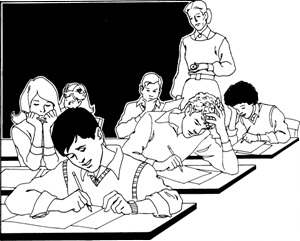 영어토론방 영어토론방 | Home>영어토론방 |
Education Students, Professors Fight Against Cheating
페이지 정보

본문
 Lee Jin-oh, second from right, director of the university students’ association for fighting against cheating, speaks at a seminar about academic integrity at the Korea Press Center, downtown Seoul, on Sept 23. /Korea Times
Lee Jin-oh, second from right, director of the university students’ association for fighting against cheating, speaks at a seminar about academic integrity at the Korea Press Center, downtown Seoul, on Sept 23. /Korea Times A 24-year-old college student identified as Lee failed to earn a scholarship last semester though she studied hard.
A classmate of hers got the scholarship with excellent grades after cheating on the exams.
``I saw her using a cheat sheet during the final exam. She got the scholarship. I feel frustrated and think she stole my scholarship from me,’’ she said.
Around exam time, the Web sites of colleges are bombarded with postings calling for eradicating cheating in the academic arena.
In the past, college students copied exam answers from their classmates to get good grades during the school year.
``The most serious problem in our society is a lack of awareness among school authorities of academic dishonesty,’’ Oh Young-hee, a psychology professor at Duksung Women’s University in northern Seoul, said in an interview with The Korea Times.
Oh said that the indifference among school authorities, including teachers, enables students to easily cheat on the exams because they are not worried about being caught.
``About 63 percent of some 700 college students in my survey answered they have never been punished after being caught for cheating on exams,’’ she said.
However, she said that a measure to increase the number of proctors in the test rooms will go a long way to stop students’ chronic wrongdoings.
According to Oh, there are three kinds of academic dishonesty, such as cheating on the exams, plagiarism, and proxy attendance.
``In our country, however, many students commit academic irregularities that mostly affect their school grades on tests and attendance, which accounts for about 10 percent of grades,’’ she said.
She stressed that college students have discovered various ways to copy from their classmates while taking exams compared to students in other countries, along with proxy attendance.
Cheating or plagiarism leads to poor performances in the future, she said.
As part of the countermeasures, she said that universities should introduce an honor system.
The honor council is designed to induce students and professors to volunteer to prevent cheating or academic dishonesty, by setting up the honor code.
At Duke University in the United States, the honor council consists of 18 students and 6 faculty members to raise awareness about academic integrity.
According to statistics released by Oh, younger and younger students are cheating in school.
She said that about 25.2 percent of high school students were found to first cheat on exams in elementary school, while 57.9 percent first cheated in middle school in 2003.
According to the report, only 6.8 percent of high school students have never cheated on an exam.
Oh said that about 72 percent of college students do not feel guilty about cheating, she said, citing her report released in 1999.
``The statistics indicate that the large-scale cheating scandal, which hit the nation in the College Scholastic Ability Test among high school students, was not an isolated case,’’ she said.
``It reflects the long practice of academic dishonesty as younger children as well as university students choose to copy answers to get high scores,’’ she added.
Chung You-jin, a senior majoring in business administration and a student council leader at Sookmyung Women’s University, said that students are trying to expand the campaign to raise awareness on academic integrity.
``It is difficult for students to resist cheating on exams because many other students do it and get good grades. If somebody sticks to academic integrity, he or she will be at a disadvantage,’’ she said.
``I think many students plagiarize using the Internet. We will try to contribute to setting up the rules and campaigns fighting against academic dishonesty,’’ she added.
Oh added that both students and their parents should change their way of thinking about ethics in academic performance and move away from simply valuing entering prestigious universities.
The university students’ association against cheating was launched on May 25 in a bid to eradicate academic dishonesty on the campuses, an association of over 100 universities nationwide.
Question
1. Have you ever seen that someone cheat at exam? If so, how did you feel?
2. Then, have you ever cheat on your exam or using the Internet to cheat on reports and research papers?
Tell us 'frankly'.(ㅋㅋㅋ)
3. In your opinion, why students cheat?
4. What is the best way for college teachers to prevent students from cheating on exams?
Was it easy to cheat on exams at your college?
댓글목록
등록된 댓글이 없습니다.

